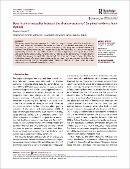| dc.contributor.author | Stephen, Esaku | |
| dc.date.accessioned | 2023-05-31T10:06:22Z | |
| dc.date.available | 2023-05-31T10:06:22Z | |
| dc.date.issued | 2021 | |
| dc.identifier.citation | Esaku, S. (2021). Does income inequality increase the shadow economy? Empirical evidence from Uganda. Development Studies Research, 8(1), 147-160. | en_US |
| dc.identifier.uri | https://doi.org/10.1080/21665095.2021.1939082 | |
| dc.identifier.uri | https://hdl.handle.net/20.500.12504/1362 | |
| dc.description.abstract | This paper applies the autoregressive distributed lag bounds testing method to investigate the
long- and short-run relationship between the size of the shadow economy and income
inequality in Uganda. The findings reveal evidence of the long and short-run relationship
between the shadow economy and income inequality. We find that a rise in income inequality
significantly increases the size of the shadow economy in Uganda, all else equal. These results
are robust to the use of alternative econometric methods. At the policy level, instituting income
redistribution policies to uplift the standard of the poor, improving resource allocation to
productive sectors of the economy, reforming the tax system and macroeconomic environment,
and implementing political and institutional reforms to address corruption could be viable
policy options to address informality in Uganda. | en_US |
| dc.language.iso | en | en_US |
| dc.publisher | Development Studies Research | en_US |
| dc.subject | Income distribution | en_US |
| dc.subject | Informal sector | en_US |
| dc.subject | Income inequality | en_US |
| dc.subject | Government spending | en_US |
| dc.subject | Shadow economy | en_US |
| dc.subject | Taxation | en_US |
| dc.title | Does income inequality increase the shadow economy? Empirical evidence from Uganda | en_US |
| dc.type | Article | en_US |

